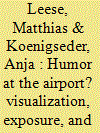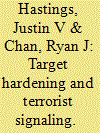|
|
|
Sort Order |
|
|
|
Items / Page
|
|
|
|
|
|
|
| Srl | Item |
| 1 |
ID:
137614


|
|
|
|
|
| Summary/Abstract |
With the emergence of aviation as a target for terrorism and serious crime in the 1970s, the affective dimension of airport security changed drastically and is now carefully engineered as a zone of earnest and solemn protocol. Against a backdrop of bombings and hijackings, airport security today enacts a “no bullshit” approach to the “war on terror.” Humor has essentially been banned from screening operations. From signs reading “No bomb jokes, please,” to drastic consequences in the case of non-compliance, security appears as something that is not to be fooled around with. Against this background, this paper builds on ethnographic fieldwork at Hamburg airport during the German trial run with body scanners in 2011. During the time of observation, we found a surprising amount of reciprocal laughter and joking. We argue that this can be conceptualized as an attempt to break open a space for laughter, momentarily abandoning protocol in order to deal with issues of visualization, exposure, and shame which arise from the new focus on the fleshly anatomical body.
|
|
|
|
|
|
|
|
|
|
|
|
|
|
|
|
| 2 |
ID:
100292


|
|
|
|
|
| Publication |
2010.
|
| Summary/Abstract |
This paper investigates regimented language choices at Naha Airport in Okinawa Prefecture in order to study how these language choices relate to language ideology on one hand and to creating a self-supporting language ecology of maximum diversity on the other. Issues of power and ideology underlie the language choice and the language ecology which evolve from them, as well as ideologically erased language choices. Despite its multilingual heritage and the presence of a large English-speaking community of US military personnel on the island, Naha Airport reproduces ideas of individual and societal monolingualism with regard to Japan as well as to neighbouring countries. Owing to entrenched nationalist ideology and language attitudes, a change in such language regimentation cannot be envisaged in the near future, despite several shortcomings in the present linguistic organization of Naha Airport. Officially regulated public spaces accessible to all, such as Naha Airport, can play a key role in readjusting and re-evaluating specific behaviours and values.
|
|
|
|
|
|
|
|
|
|
|
|
|
|
|
|
| 3 |
ID:
125130


|
|
|
|
|
| Publication |
2013.
|
| Summary/Abstract |
In this article, we examine the relationship between hardening a target and the value that a terrorist group derives from attacking it. We use a simple expected value framework to compare how the expected value of attacking a hardened target varies between a violence-based approach, where terrorists are presumed to be maximizing the physical damage done to the target, and a signaling-based approach, where terrorists are presumed to be maximizing the symbolic value of their attack. We argue that, if it is proper to understand terrorist attacks as costly signals of terrorist strength or determination, hardening a target actually increases the expected value of attacking a target (relative to its value before hardening), even if the attack fails. We go on to examine the evolution of aviation security, and trace how al-Qaeda's views of airplanes and airports as targets have changed since 9/11. As aviation targets were hardened with increasingly onerous security measures, al-Qaeda began to see even attacks that did not result in detonation as successes, in large part because of what they signaled about al-Qaeda's abilities, and the ability of al-Qaeda to impose costs on the U.S. and other countries even in the absence of explosions.
|
|
|
|
|
|
|
|
|
|
|
|
|
|
|
|
| 4 |
ID:
145330


|
|
|
|
|
|
|
|